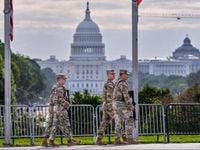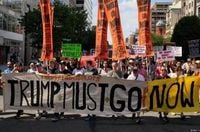On a humid Saturday in early September 2025, the streets of Washington, D.C. filled with thousands of residents chanting, singing, and waving protest signs. Their message was clear: they opposed President Donald Trump’s ongoing deployment of National Guard troops and federal law enforcement in the nation’s capital. The demonstration, dubbed the “We Are All DC” march, began in Meridian Hill Park and wound its way down 16th Street NW toward the White House, drawing together labor unions, faith organizations, immigration advocates, and political groups in a rare display of unity and urgency.
This outpouring of dissent came at a time of deepening political and legal conflict over the president’s decision to deploy military forces in D.C. Under the pretext of combating crime and homelessness, Trump had declared a state of emergency on August 11, 2025, asserting unprecedented control over the city’s police and ordering nearly 2,300 National Guard troops—some from as far away as Texas, South Carolina, and Georgia—onto city streets. According to a joint National Guard task force, 1,340 of these troops hailed from seven Republican-governed states. Some were armed, especially in tourist-heavy areas, and their presence was highly visible in public spaces like the National Mall and Metro stations.
Trump’s actions did not stop at Washington. In the days leading up to the protests, he threatened to send National Guard units to other Democratic-led cities, including Chicago, Boston, Baltimore, New Orleans, and Portland. On social media, he posted an AI-generated image of himself with a burning Chicago skyline, referencing the film “Apocalypse Now” and writing, “I love the smell of deportations in the morning… Chicago about to find out why it’s called the Department of WAR.”
Local officials and Democratic leaders were quick to condemn the president’s moves. Washington Attorney General Brian Schwalb, who was elected in 2022 and announced plans to seek reelection in 2026, called the deployment a “forced military occupation” and filed a federal lawsuit on September 4, 2025, seeking to force the withdrawal of the National Guard and prevent similar actions in the future. “Deploying the National Guard to engage in law enforcement is not only unnecessary and unwanted, but it is also dangerous and harmful to the District and its residents,” Schwalb said in a statement reported by CBS News and The Washington Post. “No American city should have the U.S. military—particularly out-of-state military who are not accountable to the residents and untrained in local law enforcement—policing its streets. It’s D.C. today but could be any other city tomorrow.”
Schwalb’s lawsuit is the second he has filed against the Trump administration since the emergency declaration. It argues that the president has exceeded his authority and that the use of National Guard troops for law enforcement violates the Posse Comitatus Act—a federal law that sharply limits the military’s role in domestic policing. The suit also contends that D.C. National Guard troops, unlike those in other states, fall under the president’s command unless there is a genuine national emergency, and that the mayor should have been consulted before out-of-state troops were brought in. The legal questions are complex, owing to D.C.’s unique status; unlike state governors, the D.C. mayor has no control over the city’s National Guard.
White House spokesperson Abigail Jackson defended the president’s actions, telling reporters that Trump was “well within his lawful authority to deploy the National Guard in Washington” and that the lawsuit was an attempt to “undermine” successful operations to stop violent crime. The administration pointed to police statistics showing that overall crime had decreased by 8% over the previous week and that, during the first 19 days of troop deployments, crime was down by almost half compared to the same period in 2024. Yet, local officials and many residents disputed the effectiveness of the military presence, arguing that the deployment had not meaningfully reduced crime and instead eroded the city’s autonomy.
Washington Mayor Muriel Bowser, while critical of the National Guard deployment—especially of troops from other states—sought a pragmatic approach. She issued an executive order to end the state of emergency but acknowledged that National Guard troops would remain in the city until at least December, with some assigned to non-security roles. Bowser also announced an agreement with the administration to continue collaboration between local police and federal law enforcement, framing her strategy as one of protecting home rule and leveraging federal resources where possible. “My 100 percent focus is on exiting the emergency, and that’s where all our energies are,” she said at a news conference, as reported by The Washington Post.
The protests themselves were a vivid display of grassroots resistance. Marchers carried banners demanding “End the occupation of Washington,” “Washington must be liberated,” and “Get the ICE Out,” in reference to recent immigration enforcement actions. Chants of “Trump must go now” echoed down city streets. Gail Hansen, a 71-year-old D.C. resident, told States Newsroom, “I believe in freedom, and I think we’ve all gotta let everybody know that what’s happening on our streets is unacceptable. ICE needs to go home. The National Guard needs to go home. FBI needs to get out of our streets. We are doing just fine in D.C.”
Not everyone agreed with the protesters or city officials. Many conservatives and Trump supporters argued that the president’s use of the National Guard was necessary to restore order and protect federal property, particularly in the face of rising crime and homelessness. They saw the lawsuit and protests as politically motivated attempts to undermine a lawful and effective response to urban disorder. House Republicans even began considering legislation to remove Attorney General Schwalb and replace him with a presidential appointee, according to reporting by The Washington Post.
Nationally, the debate over military involvement in domestic law enforcement is not new, but the scale and duration of the current deployment in D.C. have raised the stakes. Legal experts cited by The Washington Post noted that the question of whether the D.C. National Guard is inherently federal or akin to a state militia remains unsettled. The outcome of Schwalb’s lawsuit could set a significant legal precedent, potentially clarifying the limits of presidential authority over the capital’s security forces. As Elizabeth Goitein of the Brennan Center for Justice put it, “Under the Department of Justice’s interpretation, a president could just use the D.C. National Guard as his own personal police force, and that raises all of the dangers that the founders were concerned about when they established a standing army.”
Meanwhile, the city’s residents continue to grapple with the day-to-day realities of a militarized capital. National Guard troops have not only patrolled public spaces but also engaged in activities ranging from helping people in medical distress to cleaning streets and collecting trash. While some see these efforts as helpful, others view them as a troubling normalization of military involvement in civilian life.
As the 30-day emergency order approaches its expiration on September 10, uncertainty hangs over Washington. Will the troops remain through December, as planned? Will Schwalb’s legal challenge succeed in curbing presidential power? For now, the only certainty is that the battle over the soul and governance of the nation’s capital is far from over.






